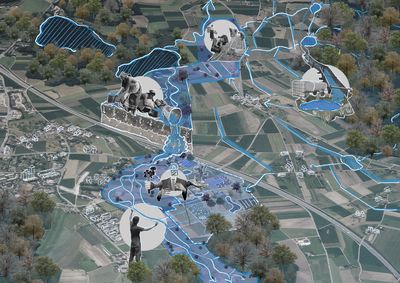WaterHydrotopiaAlexander Meier, Aron Karrer, Jan Aebi, and Alan Thomas
Over the course of the last two centuries, farmers drained almost 90 % of wetlands in Switzerland to gain land for agriculture production. Our site in Zürich Nord, located in the Furt Valley, is no exception. The area that once consisted of marshlands and small-scale fields divided by hedges has transformed into vast arable land where humans aim to control the flow of even the last drop of water.
The drainage of land has proven to be a problematic practice. On the one hand, water runs off too quickly on drained land, causing soil erosion and leading to excess water on other areas. On the other hand, the loss of wetlands accelerates climate change as its soil can store great amounts of CO₂. Biodiversity is threatened as well since many specialised species can only be found in this environment. Finally, the drained soils are not apt to deal with the increasing number of heavy rainfall events and draughts ahead.
Introducing spatial interventions to slow down the water runoff and to keep the water on the site would allow to restore valuable wetlands while increasing local water self-sufficiency and resilience.
